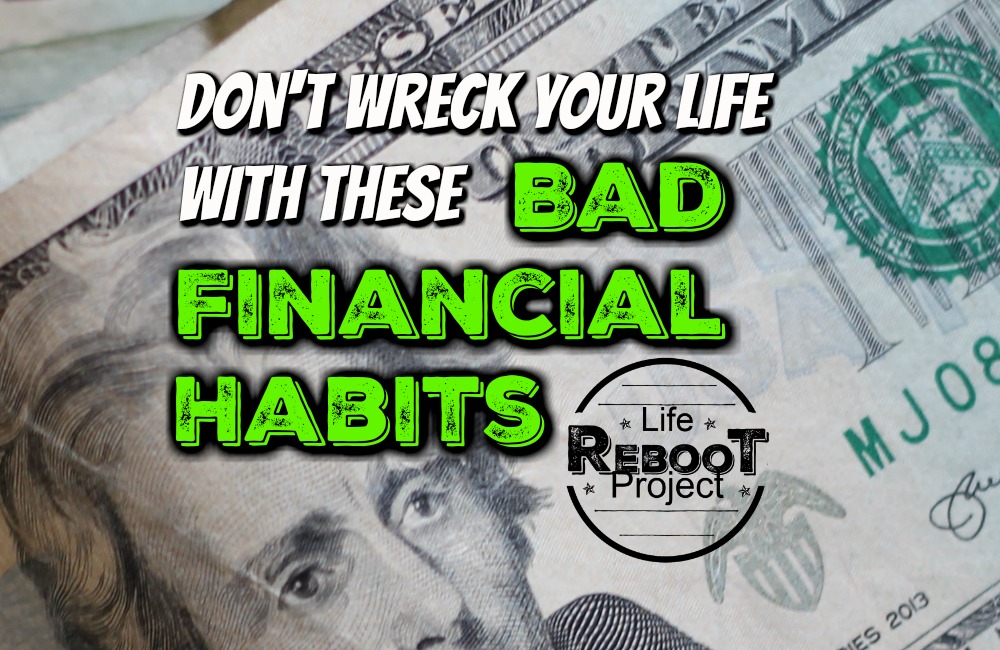
I’ve been in debt. I know what it’s like to want things and have some extra money in your pocket. The problem is, that adopting bad financial spending habits now can put you on a downward spiral for the rest of your life. In my late teens and early twenties, I landed a job that seemed to put more money in my pocket than I needed.
I also fell into the typical trap of credit card companies sending card offers saying, ‘Congratulations, you qualify for an X-dollar credit card.” I was so impressed that I qualified for something, I filled them out and sent them in. I was sure they recognized something special in me. Well, to be honest, it was a trap.
I woke up several years later in debt and feeling dumber than I ever had been. I went from qualifying to owing. I’ve been through the trappings of financial destruction, and I have some tips that helped me out and hopefully will do the same for you.
Financial Advice Tip #1 | Don’t buy on credit with money you don’t have.
Having the money in your bank account for the thing you buy was the biggest game changer for me. I thought for years that if you wanted something, you just went and got it. I would go out to eat, and people would whip out their credit cards to pay. I thought they were big shots. It looked impressive, so I started doing the same. I wanted to be a big shot too. The problem is I didn’t know their strategy if they had one at all.
The smart ones probably did. They probably had the money sitting in their accounts to pay the card off every month without accruing any interest. The less smart ones, well, either they figured it out, or they probably are in a worse financial position than I am now.
Some of them were my friends back then, so I hoped the best for them, but I can’t urge you strongly enough when you whip out that credit card to buy dinner or anything else, you know in the back of your mind the money is there to pay it off when you get home.
I do agree though; credit cards are convenient and can save the headaches of carrying around cash.
Another Quick Financial Advice Tip for You
When you begin using credit cards for the first time, set up an envelope system for what you spend on that card. For everything you spend, take the cash and stick it in an envelope. Then, at the end of the month, take the money, put it in your bank account, and pay your card off.
Sometimes you can get so caught up in spending on that card you will lose track of how much you’ve spent for the month. After a couple of months, you’ll get good at knowing what you have to spend, so you don’t go over, but early on, it will keep you from going over your own budgeted limit.
Financial Advice Tip #2 | Don’t buy things you don’t need because they are a good deal.
My wife gets caught up in this sometimes. She is such an excellent negotiator, and she is always on the lookout for the best deal. Sometimes we end up with four bottles of dishwashing soap just because they were a good deal. I keep telling her, “If they invent a new way of washing dishes without soap, we’re screwed! We’re stuck with the extra three.”
But, the point is, be mindful of the things that you need as opposed to the things you don’t which are ‘deals you just can’t pass up.’ The exception to the rule, there is usually always an exception if you look hard enough, is if you have a plan to arbitrage the cheap deals into making some money.
This is a good thing. The problem is you can fall into the hoarding trap. If you buy extras to sell them, sell them right away. Don’t sit on them and wait for just the right moment to come. Get them and turn them around that day or the next. That is just a smart and easy way to make money.
Financial Advice Tip #3 | Don’t go to the store without a list or a set goal.
Having a list has never been a real problem for me. If I don’t go to the store with a list of things I need, I’ll forget half of what I need. Many people are far into the trap of straying off the list even if they have one.
Lists make sure you do have some plan when you go to the store. You will need to have the willpower to stay on the list and not get badgered into the impulse buy. Marketing companies and stores want those candy bars staring at you as you sit in that checkout aisle. Those aren’t by accident, and they could probably save a lot of stocking and inventory time by combining them into one section.
Oh wait, they already do. They are in the candy aisle. Those candy bars and magazines aren’t in the check-out aisle for the fun of it. They are there to work on your mind to get you to spend money you didn’t plan to use. If no one bought a magazine or candy bar out of the aisle, the store would lose money on it by having someone do an inventory count on the candy bars in every aisle.
Don’t worry; you are not alone if you’ve ever bought anything from the check-out aisle. I’ve blown my diet a time or two by grabbing my favorite Mounds bar while waiting to pay.
Financial Advice Tip #4 | Don’t build a lifestyle to keep up with your friends if you can’t afford it.
Social pressure is enormous. If a friend or neighbor has a shiny new ‘this or that,’ we need one too. What we don’t often see times is that a person might have been saving for weeks or years to get the money for it. At least I hope they have. This is where a budget will go to work for you.
A reasonable budget will help you see what type of lifestyle you can afford. There is nothing wrong with having a unique and extravagant lifestyle if it fits your budget. If the lifestyle you want doesn’t fit within your budget, find a way to increase your income or rework parts of your budget to get what you want.
I believe anything is possible with a good plan.
Financial Advice Tip #5 | Don’t buy the most expensive when the cheaper ones work for what you need.
We all want quality. But in some cases, the most expensive doesn’t mean the highest quality. I’m not saying to do your shopping exclusively at the dollar store because much of the stuff there is what I call ‘losing money.’ There are acceptable limits, and you need to know the acceptable limits for the item you need to buy.
If you spend a little more on something, you use every day. Great! If you spend way more for something you use once a year, you might be able to get something cheaper for the amount of time you use it. I bought a new front door for our house and spent enough on it. My wife thought I spent too much, but the features I wanted, like the blinds sandwiched between the inner and outer pieces of glass, weren’t available on the cheaper models. I spent more because I didn’t want to clean dusty blinds on the door continually.
That door cost enough, but I believe it was at the low-end threshold of everything I wanted in a door. So, I bought it. (and, I paid in cash with money I saved up for in my budget)
Financial Advice Tip #6 | Don’t feel you need to spend the money just because you have a little in your pocket.
I’ll throw more into the mix because I think it may be one of the most important. If you ever find yourself with some extra money in your pocket, resist the urge to spend it.
Filter it into your nest egg savings plan or back into paying the debt. I see too many of my friends who have some extra money, and it almost seems like it’s burning a hole in their pocket.
If this happens to you, I suggest thinking first about where you want to be in your future and then taking that money and forgoing short-term rewards for long-term happiness. Put that money into something to make your plan work out a little sooner. You may look at The Children’s ISA and other investment opportunities instead of spending money on things you don’t really need.
I hope the above tips get you a little closer to your ultimate financial plan because that’s what it’s all about. Being able to afford to live the way we want to live without having to adhere to someone else’s working agenda.
Till we talk next time, be safe.
Kevin

